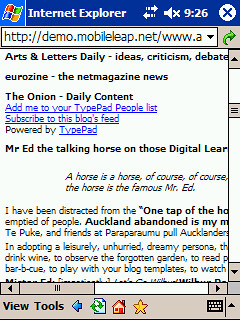Reading another exceptionally thought provoking post from Borderland, Deschooling Revolution and the section The Power of Dialog. This post started as a draft comment for Doug, but the more the thoughts unfolded, I find it hard to be concise and frankly, to stay on track. So, I'll stick my thoughts here and throw a trackback Borderland's way.
Doug, your post resonates with me on a few levels. But it was when I got to this section, my own thoughts started racing off to their own conclusions.
The best I can do to work for change on my own is to question the moral righteousness of activist pedagogy, and concentrate on simply cultivating human connections with students and their parents through dialog. The time for sweeping changes may be overdue, but I don’t see how educators are going to initiate that process. The problems we confront are not merely institutional, they are embedded in the relationship between schools and society. Sincere dialog may be the most practical revolutionary stance a teacher can assume at this time.
While we approach the delivery process of education down under differently to the States, there are many parallels to be made. I think that as educators, we have dodged meaningful dialogue and exchange of perceptions with parents for a long time now hiding behind jargon, government mandates and vague philosophies in a bid to keep them at arm's length. We're never going to get away with the "I'm an expert in a unique profession" line that say a geophysicist or structural engineer can, because as a teacher, I'm in no position to challenge his or her methods or knowledge.
One of the unique aspects of teaching is that everyone we come into contact with has at one time been a student themselves which then gives them an opinion (in their mind) on how classrooms should be run and what content should be taught. But their opinions are more often than not coloured by their own educational experiences. If everyone stood and recited their times tables when the parent was at school, then why isn't my child doing the same? Standards must be slipping is the inferred notion. It's a bit of a cruel paradox, parents know deep down that things have changed and their kids need new skills to survive in and beyond school......but.......what are those teachers doing with my child's education? Isn't anything we learnt relevant any more?
So we, the teachers, have to let them know that the curriculum we teach does cover essential time honoured skills but the future is approaching very fast, if it isn't here already. So if we don't want politicians dictating educational policy, we want parents on our side. And we need to make sure that they know what we do and why we do it in our classrooms, what our expectations for their children are - basically become more transparent as professionals. So, a small goal for myself in my classroom duties this year is use technology to keep parents in the loop, explain the curriculum as it goes and while probably not approaching the transparency that will be needed, hopefully I can at least work towards becoming opaque. I know that a couple of weeks into the start of the 2006 year will be the annual Acquaintance Night at my school. What will I say on that evening that will open me up to a more meaningful dialogue with the parents of my students for the coming year? An opportunity will go begging if I hide behind the razzle-dazzle of promised new technology (another IWB) or the platitudes of local middle school structures. I've got to say here's what I have to teach (curriculum) and here's some of the ways I'm going to help the kids with their learning (methodology). Usually teachers on this particular night lock down their presentations so tight as to avoid unwelcome or awkward questions from their caregiver audience. How refreshing it would be from their perspective to have their child's teacher allowing the parents to set the agenda and share the direction of the conversation. It's risky because it leaves the teacher (in their mind) open for criticism, a sitting target for parents keen to score credibility points with their peers. But that's assuming that freedom will bring out the worst traits in people who just want to be assured that you have their child's best interests in mind.
Maybe if these technologies achieve nothing else, using them to keep parents informed and with the flow of learning may help to get them onside and be willing to give me, the teacher, the trust and scope to operate freely interpret the curriculum and skills continuums in ways that my experiences tell me will engage my students.


